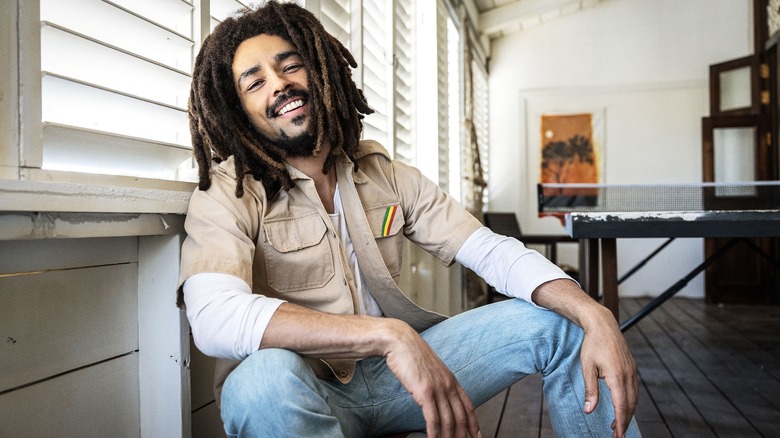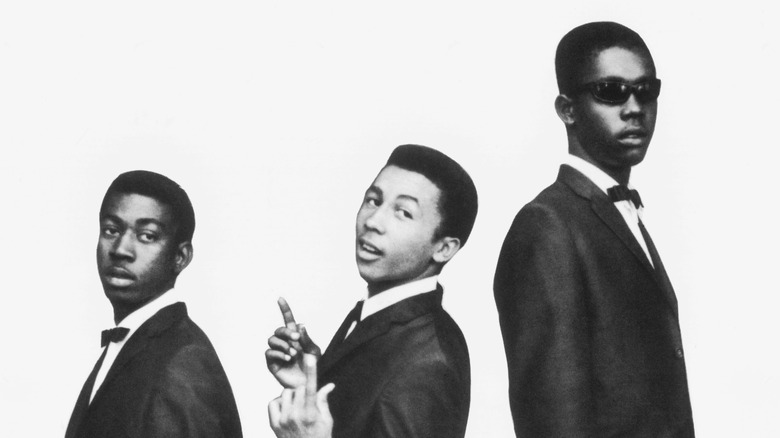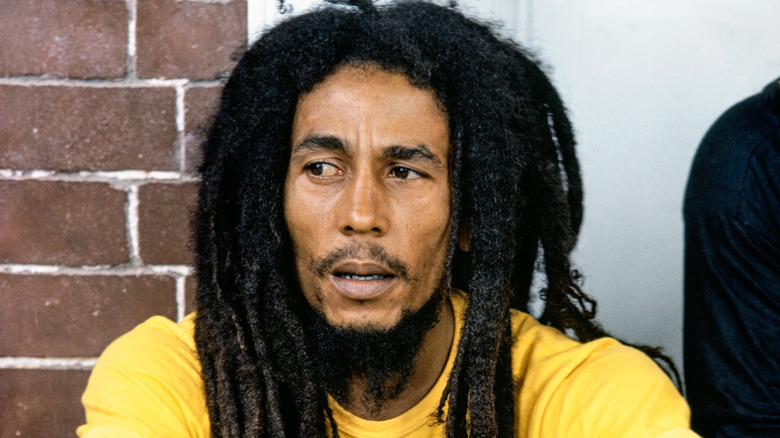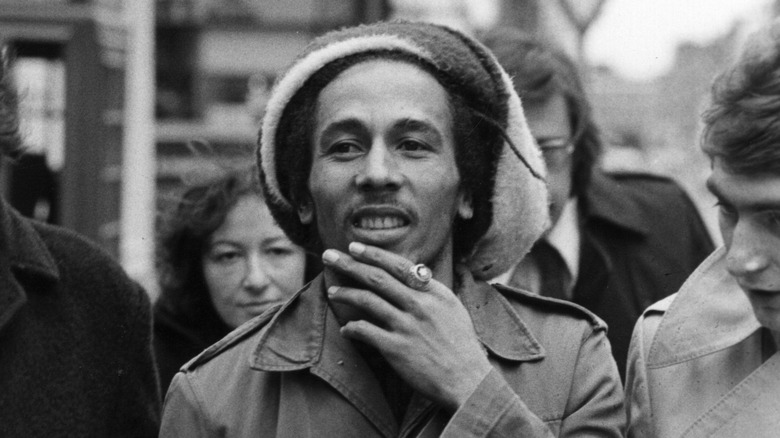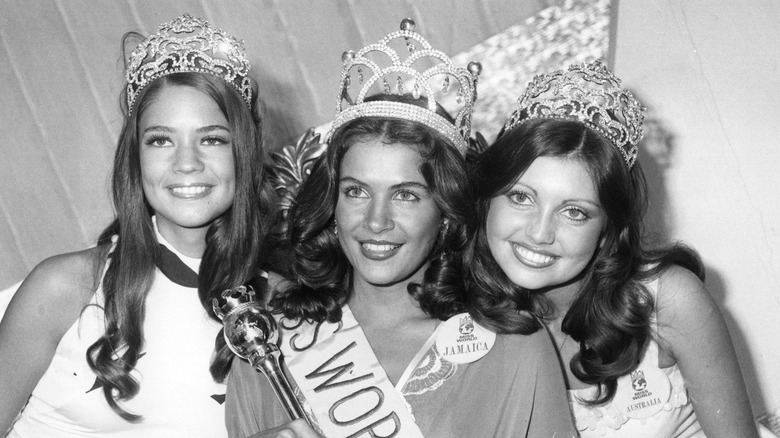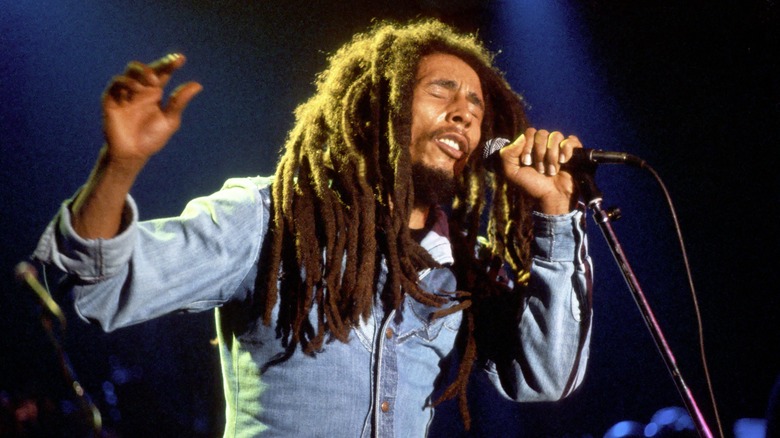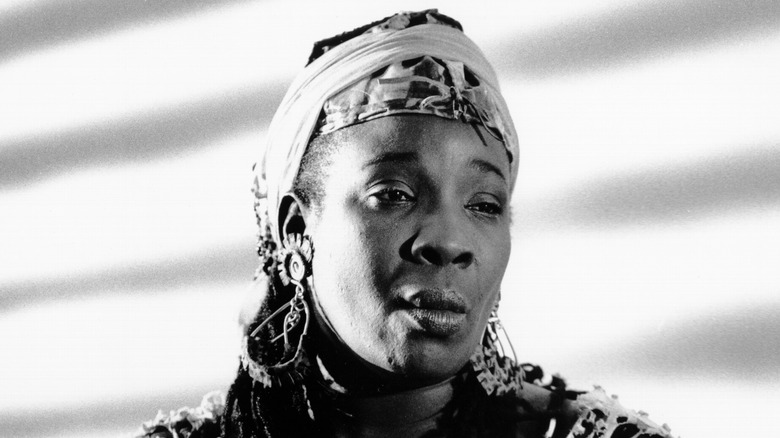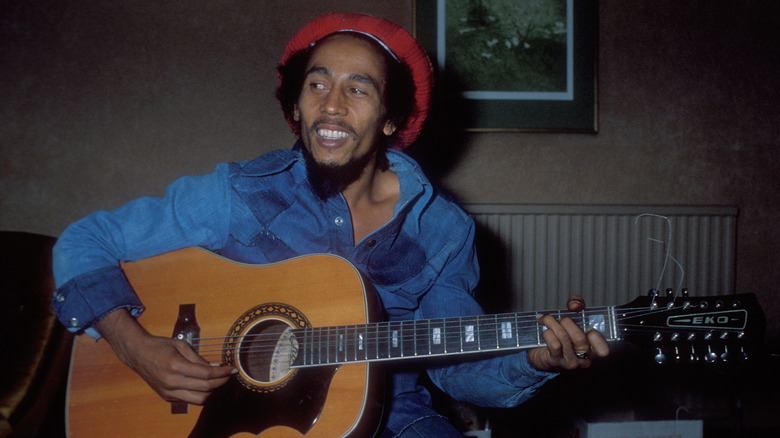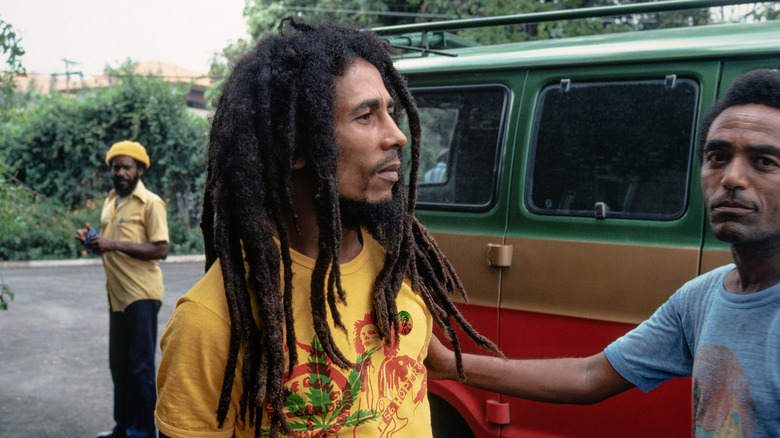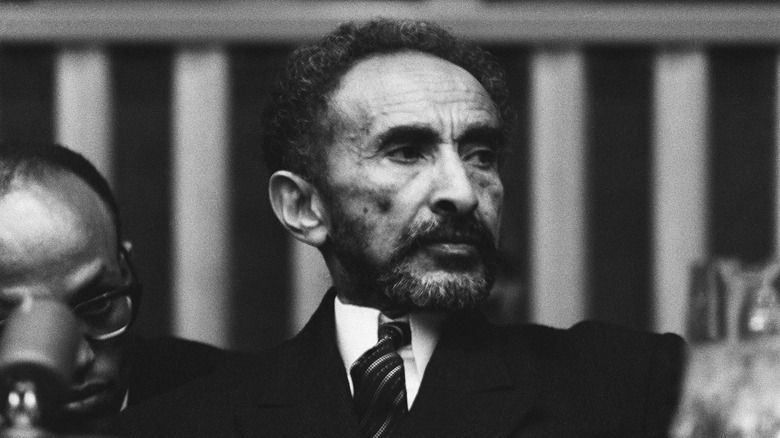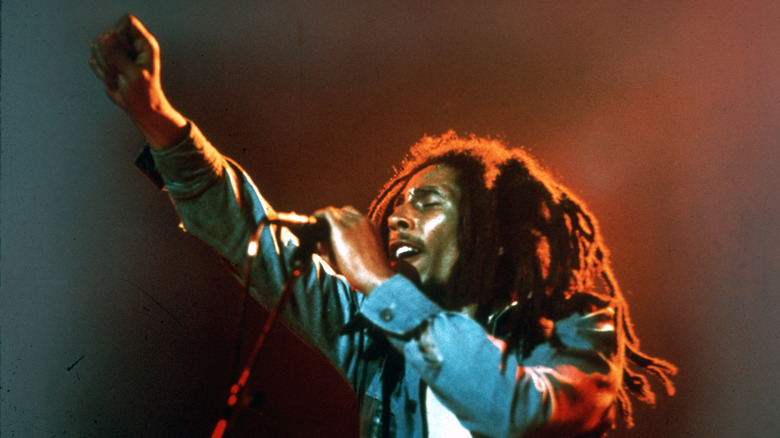Things Bob Marley: One Love Left Out Of The True Story
In this world, nothing is certain but death, taxes, and biopics about musicians. Every year, a new beloved artist gets their story churned through the filmmaking process, from Freddie Mercury to Leonard Bernstein. This year, it's reggae icon Bob Marley, whose quest to spread the messages of Rastafari through music is chronicled in "Bob Marley: One Love." However, unlike the traditional cradle-to-grave approach to the music biopic, seen in films like "Rocketman" and "Elvis," "One Love" focuses on a few pivotal years in Marley's life, specifically from 1976 to 1978. Following an attempted assassination in his home country of Jamaica, Marley moves to England to record what will become his politically-charged magnum opus: the album "Exodus."
Co-produced by many members of the Marley estate, including son and musician Ziggy Marley, "One Love" is meant to be an authentic and accurate portrayal of Bob Marley and his message of unity amidst Jamaica's political turmoil. However, despite the film's seemingly narrow focus, it still manages to leave out a number of important details that would give audiences a more nuanced understanding of Marley's life, warts and all. While some were likely cut to streamline the film, others were certainly scrubbed out so that the film would remain a clean, reverential homage. Here is just a taste of what the film omits from Marley's journey.
One Love skips over most of Bob Marley's early career
Though it is by design, it is impossible to ignore that "Bob Marley: One Love" effectively skips over the entirety of Bob Marley's early career, aside from some opening text inserts and the occasional flashback. The movie immediately plops audiences into Marley's life after already achieving massive fame in Jamaica; though he had yet to become a household name globally, those unfamiliar with Marley's coming-of-age will not be able to appreciate the musician's extraordinary rise from impoverished street fighter to Jamaica's leading musical talent.
Marley cultivated a love for music growing up in the Kingston neighborhood of Trench Town in the early 1960s. Though he had garnered a reputation as a fierce fighter, he was also a talented singer and songwriter. Following a welding accident that left a steel splinter in his eye, Marley decided to ditch manual work and focus on his music career; he co-founded vocal trio The Wailing Wailers, later shortened to The Wailers, with friends Bunny Wailer and Peter Tosh, who first garnered success with their 1964 song "Simmer Down."
The group produced three albums together before splitting in 1974, with Wailer and Tosh citing unfair favoritism toward Marley. Aside from a brief flashback (in which they aren't even identified on-screen) and a quick name drop, Waiter and Tosh are excised from the film's events. This was most likely done to avoid portraying Marley in a negative light, something "One Love" does frequently.
Three canaries inspired Bob Marley to write Three Little Birds
In an early scene of the film, Bob Marley is driving two of his children home from a soccer game. When the children express concern over Jamaica's growing violence, Marley comforts them by coming up with a silly song. Fans – and anyone, really – will immediately recognize it as the chorus to "Three Little Birds," one of the most popular tracks off of "Exodus." The scene would imply that this is how Marley conceived the song, but real-life testimony suggests this isn't the whole story.
In Vivian Goldman's book "The Book of Exodus," which chronicles the creation of the album, Marley says he came up with the idea after witnessing three literal little birds, specifically canaries, come to the windowsill of his home in Kingston, Jamaica. It was a sight of positivity against the backdrop of his home country enduring a civil war, which inspired him to write a song about how the little things in life will get you through even the most difficult times.
According to Marcia Griffiths, former member of Marley's backup trio I-Three and also interviewed by Goldman, the song is about them. "Bob would always refer to us as the Three Little Birds ... we knew it was our song. Everybody knew he was referring to us." Whether or not Marley singing the song to his children helped inspire the song, it was far from the sole inspiration.
The CIA was associated with Bob Marley's attempted assassination
"Bob Marley: One Love" uses Bob Marley's attempted assassination as the inciting incident for its tumultuous plot. Hours before his planned performance at the Smile Jamaica concert, in hopes of promoting peace within his divided nation, Marley and others are shot inside their Kingston home by three gunmen. Nobody is killed, however, Marley is wounded, as is his wife Rita, and manager Don Taylor. Shaken by the incident, he is pressured to relocate to England. The film doesn't identify anyone in the wake of the incident, although multiple testimonies claim that the perpetrators were an assortment of Jamaican gang members hired by the CIA.
During the 1970s, the intelligence agency closely monitored People's National Party (PNP) candidate Michael Manley, a democratic socialist who was perceived to be accommodating toward the Cuban government amidst the Cold War. The CIA teamed up with the PNP's opposing party, the Jamaica Labor Party (JLP), to suppress Manley's campaign under the guise of terrorist violence. Marley had previously supported Manley in 1972 – though he publicly insisted he didn't care about politics – which made him a target.
And so, using the 1976 peace concert as a believable political motive, the CIA allegedly hired JLP enforcer Carl Mitchell to lead a group of gunmen on a mission to assassinate Marley in exchange for weapons and cocaine. They were unsuccessful, however, the lack of any reference to the CIA in the film downplays Marley's political power in a film that claims to be inspired by it.
Bob Marley was arrested while in London for possession of cannabis
When Marley arrives in England during the events of "Bob Marley: One Love," he is walking the streets of Chelsea with two bandmates when he is approached by police officers. He is subsequently arrested and spends the night in prison. This scene is based on true events, however the implied reasoning is the systemic racial bias within the English policing system. The film coincidentally leaves out that Marley was specifically arrested for possession of cannabis.
In real life, Marley and bandmate, Aston "Family Man" Barrett, were being driven down West London in 1977 when they were stopped by the police. No traffic violation had been committed; the officers likely knew of Marley's marijuana use, which had been public knowledge as early as 1975. The police found two joints and arrested Marley, who lied about his address in an attempt to keep them from searching his home for further drugs. Barrett, not aware of Marley's plan, revealed their actual address, which led the police to discover an additional pound of marijuana. Thankfully, Marley and Barrett were only fined £50 each.
In the film, Marley is seen pipe-smoking cannabis around a campfire with fellow Rastas, among other times it's explicitly featured. Marley was open about his frequent use of cannabis and his support for cannabis legalization. This is all but erased from his brief arrest, another measure made by the Marley estate to keep Bob's image squeaky clean.
Bob Marley wrote Turn The Lights Down Low for his lover, Cindy Breakspeare
To the uninitiated, the choice to emotionally center "One Love" around Bob and Rita Marley's relationship feels like a natural one. Married in 1966, the couple held strong through many challenges up until Bob Marley's death in 1981. However, for those in the know, the biopic almost entirely omits their greatest challenge: Bob's chronic infidelity. This is most glaring in one of the film's quieter, more romantic scenes; Bob plays an early, acoustic version of "Turn The Lights Down Low" for Rita, who is touched. In reality, when the song was introduced to Rita, she initially refused to sing it after learning it was written about Marley's then-lover, Cindy Breakspeare.
Portrayed by actress Umi Meyers but given no dialogue, Cindy Breakspeare was a jazz vocalist who befriended Marley during the production of "Exodus." They soon began an extramarital romance that became tabloid fodder after Breakspeare was crowned "Miss World" in 1976. This upset Rita, still Bob's wife and a member of his backup trio, I-Three, who was forced to accept his polyamorous lifestyle.
Marley's other partners included but were not limited to politician Pascaline Bongo and photographer-filmmaker Esther Anderson. Aside from a single line of dialogue in the film, none of Bob's additional partners are acknowledged, which may be related to the fact that Rita herself is a producer on the film.
The lyrics of Exodus include Michael Manley's political slogan
One of the most entertaining scenes in "One Love" is dedicated to the inception of the title track of "Exodus." Many of the details in the scene are true, including that the name "Exodus" was partially inspired by Aston Barrett introducing Marley to the "Exodus" film soundtrack. However, another key component in the mixture is missing, a byproduct of the film's depoliticization of Bob Marley's legacy and songwriting.
During the album's production, People's National Party candidate Michael Mayer was campaigning for re-election across Jamaica. His campaign slogan was "We know where we're going," which Marley included in the lyrics of "Exodus." Though Marley never confirmed he lifted the phrase from Manley, many Rasta "brethren" believe the song is a direct response to the political machine.
In the song's lyrics, Marley spiritually reclaims the phrase as a Rastafarian mantra: "We know where we're going / We know where we're from / We're leaving Babylon / We're going to our Fatherland." In Rasta culture, "Babylon" is the oppressive Western world, and the "Fatherland" is Africa, specifically Ethiopia, where Rasta originated. The song expresses Marley's long-held dream to return to Africa, where in 1979, Marley had performed.
Rita Marley recorded her own solo album during the Exodus years
Though Bob's name is in the film's title, Rita Marley is the heart and soul of "One Love." She is a resilient partner to Marley, but also one that keeps him humble; during a heated argument – one of the few scenes that portrays Bob in a more nuanced light – Rita insists she had been provided offers to record her own music but gave them up to help spread Bob's message on tour. This is partially true, as the real Rita would only officially release her first solo albums toward the end of the touring years. However, the film does not mention that she was writing, promoting, and recording songs before this time and, more specifically, that Bob was not initially supportive.
German record label Hansa Music contacted Rita in the late '70s to produce a solo record. After years singing backup for Bob, Rita saw this as her moment to finally step into the spotlight and chart her own path. Bob, however, wanted Rita to sing exclusively with The Wailers, and had become possessive.
In Rita's memoir, "No Woman, No Cry," she recalls a time Bob got so heated that he chased a publicist away. "I think he was a little bit crazy with jealousy at that point," she writes. "It was a devastating experience and I was furious and ashamed." Eventually, Bob came to terms with Rita's decision, and her album, "Who Feels It Knows It," was released in 1981.
Doctors removed Bob Marley's toenail bed after it developed melanoma
Well into "Bob Marley: One Love," the musician is left with a toe injury following a soccer match. The film considerably downplays the severity of the injury the moment it occurred; the entire toenail came off. However, what both the film and reality share is that Marley ignored getting his toe treated, and was eventually diagnosed with acral lentiginous melanoma, a rare form of skin cancer that often begins under nail beds.
Doctors advised Marley to amputate his toe, which he refused to do. This is mentioned in the film, however the movie would have you believe Marley simply let it fester until it killed him. What isn't mentioned is that Marley did eventually undergo a less intensive surgery in 1977, during which the infected nail bed was removed in an attempt to stop the cancer from spreading. This proved to be effective, but only for a few short years.
By 1981, the cancer had found a way to continue spreading throughout his body; Marley contracted brain, liver, and lung cancer and had to go through radiation therapy, which left him without his trademark dreads. In May of that year, Marley passed away from complications caused by the melanoma. Likely out of respect for Marley, "One Love" does not recount these final years of sickness.
Bob Marley's attempted assassins were executed in front of him
One of the film's final scenes sees Bob Marley confront one of the gunmen who attempted to assassinate him. Marley is forgiving of the young man and lets him go without punishment. There is no record of this confrontation in real life – perhaps it was inspired by one of the Marleys' personal accounts – but it does directly contradict what we do know about the aftermath of the attempted assassination. Needless to say, the actual gunmen weren't so lucky.
In his tell-all memoir "Marley and Me: The Real Bob Marley Story," the musician's former manager, Don Taylor, claims that he and Marley were taken to a remote area in Kingston, Jamaica, and put face-to-face with three of the suspected gunmen. They had been captured by Jamaica Labor Party gang leader Claudie Massop (who is a featured character in the film, but not in this fashion), who was close with Marley. The gunmen corroborated long-held suspicions that the CIA had pressured them into committing the crime and proceeded to beg for forgiveness. Unfortunately, it was not enough to absolve them.
In the name of justice, two of them were hanged and the third was shot in the head. "The grisly events of that day are still vivid in my memory," Taylor writes. "[Bob and I] never mentioned that day again."
Bob Marley discovered a father figure in Rasta's Messiah, Haile Selassie I
One of the recurring motifs in "Bob Marley: One Love" is a dream sequence that slowly unravels every time it reappears in the film. The surreal vignette sees Marley as a scared child running through a field of fire. In one of the film's flashback sequences, he is confronted by a man on horseback, dressed in the same clothing as his father. However, the rider is shown to be a Black man, not white like his father, and the two ride off together. For casual viewers, this is a confusing culmination that is given no explanation. However, further research reveals this is meant to be Haile Selassie I, former emperor of Ethiopia, and the proclaimed messiah in Rastafarian doctrine.
As conveyed through one of the film's flashbacks, Marley's father was a white colonial farmer who, after marrying Marley's Black mother, abandoned the family. Born as a mixed child and left without a father, Marley would later be embraced by Kingston's Rasta community after marrying Rita (as portrayed in the film).
"One of the early slogans of Rasta was 'mother forsake you, father forsake you, Rasta will take you,'" explains Reggae researcher Garth White in the documentary "Bob Marley's Life Story." "Bob felt a special affinity for Selassie based on his rejection by his father." The dream sequence is ultimately meant to symbolize this interior relationship, even though little about Selassie is explained in the final film.
Bob Marley released four more studio albums after Exodus
"One Love" concludes at the eponymous One Love Peace Concert in 1978, leaving Bob Marley's final years to a series of interstitials and select archival clips. However, Marley's career and music continued beyond the concert in many ways, including moments left out within the film's events. Despite the film's focus on the production and success of "Exodus," 1978 also saw the release of the chart-topping album, "Kaya." In fact, the album was actually released a month before the aforementioned concert and included one of Marley's biggest hits, "Is This Love," which is featured in the film's end credits.
Three more studio albums were released in the following years: "Survival" in 1979, "Uprising" in 1980, and "Confrontation" in 1983, the latter of which was released posthumously after Marley's death in 1981. The film pays tribute to "Uprising" in one scene, when Marley performs an acoustic version of the album's most well-known song, "Redemption Song." One of Marley's biggest hits, "Buffalo Soldier," is entirely absent from the film, including the end credits; though released on "Confrontation," the album garnered Marley's all-time highest chart position in the UK.
